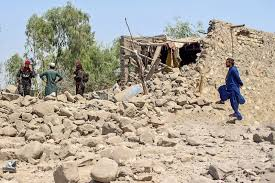RASC News Agency: The United Nations has issued a stark warning over the worsening crisis in Afghanistan’s quake-stricken Kunar province, revealing that nearly a quarter of the affected areas remain contaminated with landmines and unexploded ordnance left from decades of war. For thousands of families already devastated by the earthquake, every step on their shattered land now carries the risk of death or mutilation. UN spokesperson Stephane Dujarric announced on Thursday, September 4, that the UN Mine Action Service had sounded the alarm about the scale of contamination in Kunar, describing it as a “catastrophic double burden” for survivors displaced by natural disaster yet trapped by the remnants of conflict.
According to the UN, immediate humanitarian needs remain acute. Survivors are struggling for shelter, clean drinking water, food, medical supplies, and healthcare services. Despite aftershocks and logistical obstacles, aid organizations continue to deliver assistance, including mobile health and nutrition teams sent into remote districts. Yet the scale of need vastly exceeds the available resources. In the hardest-hit areas of Suki and Nurgal, families have been forced to live in the open, exposed to rain, disease, and insecurity. The hidden explosives pose perhaps the most insidious threat. Children, farmers, and herders are the most frequent victims killed or maimed in the ordinary course of daily life while tending fields, walking to school, or grazing livestock. What should be acts of survival securing food or water become encounters with death. As the UN noted, even after immediate relief is delivered, systematic mine clearance must remain a priority for years to come.
This humanitarian disaster, however, has been worsened by the Taliban’s incapacity and neglect. Despite claiming to rule the country, the Taliban lack the technical ability, the institutional framework, and the international credibility to lead demining operations or to coordinate meaningful relief. Instead, they continue to project propaganda about “national sovereignty,” while passing the actual responsibilities of governance to foreign aid agencies. For communities in Kunar, this has meant that survival hinges not on their rulers but on the fragile and underfunded commitment of international actors. Human rights defenders and regional analysts insist that the Taliban’s priorities are clear: suppressing dissent, tightening ideological control, and consolidating internal power struggles, not saving lives. The regime’s failure to provide even the most basic safety in disaster zones demonstrates a fundamental truth Afghanistan’s greatest threat is not only earthquakes or mines, but a ruling order that thrives on neglect and leaves its people perpetually at the mercy of catastrophe.
The UN has urged the international community to intensify support, warning that Kunar’s tragedy is not simply the aftermath of a natural disaster. It is the compounded consequence of decades of war, repression, and a regime that treats governance as an afterthought. For the people of Kunar, the ground beneath their feet is not only broken by an earthquake it is poisoned by the Taliban’s indifference.
United Nations Warns: One-Quarter of Quake-Hit Kunar Areas Contaminated with Landmines and Explosives






